Filmmaker Glenís Hunter, a multi-talented artist of Dominican, Black, and Native American descent, is making waves with her latest short, “Supa Hair.” This poignant story follows a young Dominican girl who, after the passing of her mother, relocates to Arizona with her sister. Here, she embarks on a powerful journey of self-discovery as she realizes that the very hair she has long despised holds an ancient and transformative power.
Drawing from her rich cultural background and personal experiences, Glenís Hunter is known for crafting narratives that tackle important social issues while celebrating her heritage. Through her work as a writer, director, and actress based in Los Angeles, she has consistently sought to shed light on themes of self-love, empowerment, and cultural identity.
In a statement about “Supa Hair,” Glenís shares, “I wanted to create a story that would teach, inspire, and bring confidence to all the boys and girls growing up that were just like me. My overall goal for this film is to showcase self-love in a new way.” This heartfelt sentiment underscores her commitment to representing diverse voices and empowering individuals through storytelling.
With a diverse portfolio that includes projects such as “A Walk in the Park,” “Dinner Date,” and the independent TV pilot “Woke,” Glenís has established herself as a dynamic force in the industry. Her films have been showcased at prestigious events like LALIFF and the HBO New York Latino Film Festival, earning critical acclaim and recognition.
As part of the 2023 LALIFF Inclusion Fellowship sponsored by Netflix, “Supa Hair” marks the latest chapter in Glenís Hunter’s creative journey. With its blend of cultural resonance, emotional depth, and empowering message, this short film promises to captivate audiences and inspire viewers to embrace their unique identities with pride.
In this recent interview with Glenís, she discussed her creativity behind “Supa Hair” and how the acknowledgement of cultural identity and self-love played an important role in the overall theme.
What inspired you to explore the theme of power and ancestry through the lens in Supa Hair?
I was inspired by my own journey of self-love specifically with my hair. I grew up in a culture where having textured Afro hair was frowned upon, and I spent most of my life struggling to love myself and my hair. I wanted to create something that would inspire other people going through similar situations. Most importantly, it was important for me to honor my indigenous and African ancestors, and also speak out against colorism in the Latinx community. I also really like superheroes and stories where women are empowered so I felt adding that in was also important. Lastly, I lost my father last year and this was also a way for me to process my grief.
How did the personal experiences of being Dominican, black, and Native American influence the storytelling and character development in the film?
I really wanted it to be authentic. Most importantly, as I mentioned before, I really wanted to speak out against colorism in the Latinx community, and really showcase as well that Latinos come in all different shades and colors. There’s also something really beautiful about being so diverse, and I really enjoyed adding in little nuggets of my cultures into the overall story. A lot of the things you see in the short film, like what they’re eating or wearing or doing is very reflective of the cultures itself.
Can you delve into the significance of the ancient power that the protagonist discovers within her despised hair in the context of the story?
Yes, one of my overall favorite things to learn about is ancient Egypt. And immediately when I learned of Sekhmet, the goddess of destruction and health, I was so drawn to her story. It’s a story of very familiar to what women go through today. I also had an ancestor on the island of Montserrat that was somewhat of a princess on the island and people would line up daily to comb her hair, so what I did was I incorporated, not only my culture and my ancestors, but also a topic like ancient Egypt, that I really appreciate and enjoy learning about. To me, the power overall signifies femininity and what we can unlock in ourselves, when we completely appreciate ourselves for who we are. We have the power of the universe as it was intended to be.
How did you approach the representation of self-love, power, and cultural identity in relation to hair in the film?
This is where I really dug deep inside of me and really showed a lot of my experiences with my hair growing up. Hair is such a powerful concept. I had so many life changing experiences (both positive and negative) because of my hair. Hair is so important, and it could mean so many different things to so many people depending on culture, but I feel like self-love, power and cultural identity all coincide with each other. Most importantly, the dislike that Luna has for her hair really comes from the grief that she is experiencing which is another layer to this film. It’s a disconnect from self-love, identity, culture, and power.
What challenges did you face in portraying the complexities of heritage and the emotional journey of the protagonist after her mother’s passing?
For me, it was very challenging to develop the story between Luna and her mother. I had just lost my dad at the time and writing the dialogue for these two characters really made me reflect on my own grief. It was painful, honestly. When my dad passed away, a part of me felt like I had lost my heritage, like I had lost my blackness and I saw that for Luna as well. There’s nothing harder than having to keep going when you know the number one person who cheered you on is physically gone. I don’t know what else can propel you to become more empowered.
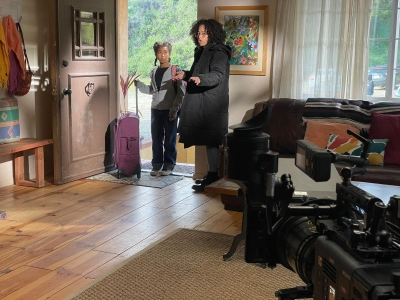
How does the setting of the Dominican Republic play a role in the narrative, and how did it contribute to the exploration of the character’s self-discovery?
The story starts in the Dominican Republic because that is where the power was lost. And I feel that the loss of power also signifies a loss of the overall appreciation for the African ancestors that were taken to the Quisquella island amongst Dominicans. It also reflects my own personal journey growing up in the Dominican Republic, and not necessarily knowing where I fit in because I was multi-racial. My Dominican mother married a black man, and that was a bit controversial in my family. So, I also feel like a lot of this movie is also healing my own family trauma.
In what ways did you incorporate elements of magical realism or fantasy to enhance the themes of empowerment and connection to ancestry in the film?
When I think of my ancestors, I usually think that they had this wonderful magic about them. I think that there’s something so beautiful to know that our ancestors connected to the stars and the universe and the sun and moon and the ground that they lived upon. There’s something really magical about that to me, and magic allows us to really explore the story without boundaries.
We can go anywhere and do anything and that’s what I want for the character of Luna but most importantly for the audience watching it. The magical element in this movie of course is the comb. The comb is what carries this power throughout all of history when it was created in ancient Egypt. The comb idea I got from my ancestor on the island of Monserrate. I also used purple sparkles to clearly signify the magic.
As a New York actress and filmmaker based in LA with a diverse background, how did your own heritage and experiences shape your directorial approach with Supa Hair?
First, it was extremely important for me as a director to have a cast and crew that reflected who the story is about. Over 90% of my crew identified as BIPOC. I love working with a crew that is predominantly, black, and brown and I was very lucky to also have an incredible crew that was mostly from New York. We just vibed. Second, this whole experience really taught me about what kind of director I want to be, and I think that if I’m writing a movie and filming a movie about self-love and culture, then that should also be reflected on my set like In
the food we eat, the way we speak to each other, etc. A lot of it was also again making sure that the choices were authentic and that we celebrated our heritage in this short film. While it could be a bit of an emotional journey this is also an opportunity to celebrate us and see us on screen!
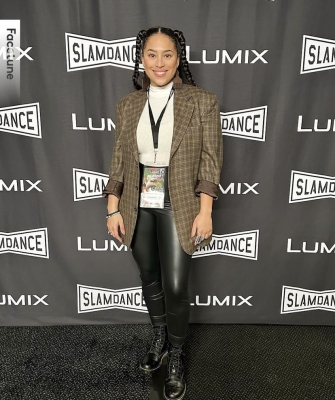

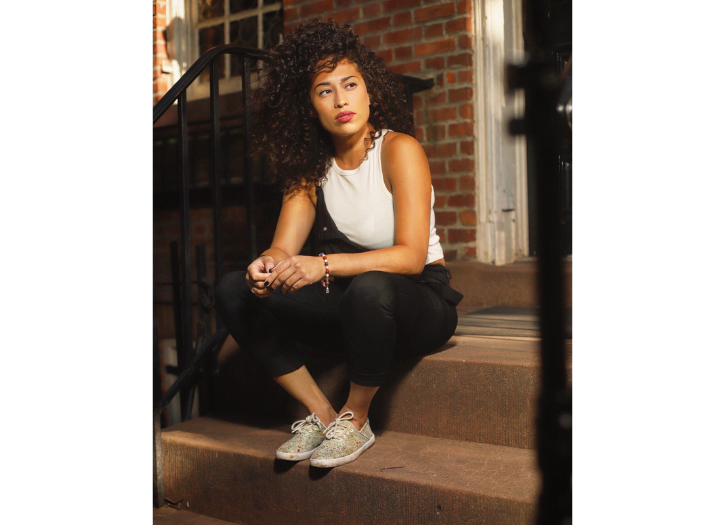

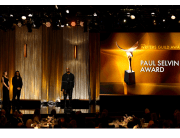
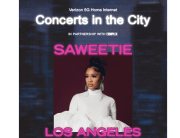

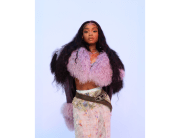
Add Comment